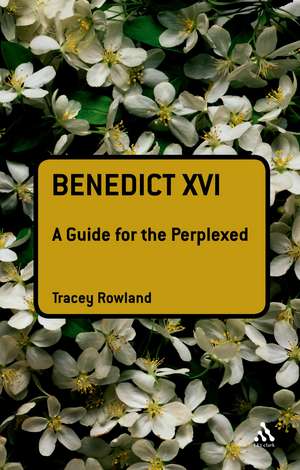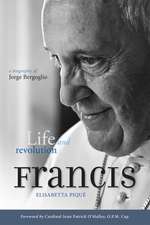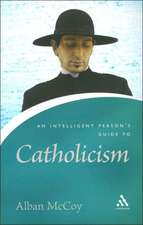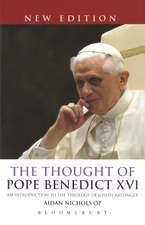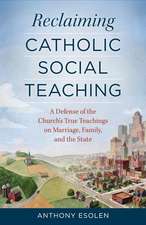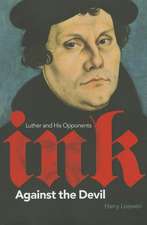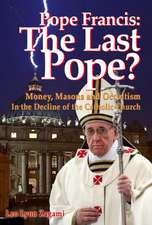Benedict XVI: A Guide for the Perplexed: Guides for the Perplexed
Autor Tracey Rowlanden Limba Engleză Hardback – 12 mai 2010
| Toate formatele și edițiile | Preț | Express |
|---|---|---|
| Paperback (1) | 164.76 lei 3-5 săpt. | |
| Bloomsbury Publishing – 12 mai 2010 | 164.76 lei 3-5 săpt. | |
| Hardback (1) | 566.67 lei 6-8 săpt. | |
| Bloomsbury Publishing – 12 mai 2010 | 566.67 lei 6-8 săpt. |
Din seria Guides for the Perplexed
- 14%
 Preț: 164.68 lei
Preț: 164.68 lei - 14%
 Preț: 163.34 lei
Preț: 163.34 lei - 14%
 Preț: 179.10 lei
Preț: 179.10 lei -
 Preț: 145.10 lei
Preț: 145.10 lei - 14%
 Preț: 133.15 lei
Preț: 133.15 lei -
 Preț: 166.82 lei
Preț: 166.82 lei - 14%
 Preț: 170.50 lei
Preț: 170.50 lei - 24%
 Preț: 150.50 lei
Preț: 150.50 lei - 8%
 Preț: 145.90 lei
Preț: 145.90 lei -
 Preț: 178.22 lei
Preț: 178.22 lei - 15%
 Preț: 163.01 lei
Preț: 163.01 lei - 14%
 Preț: 165.03 lei
Preț: 165.03 lei - 8%
 Preț: 157.75 lei
Preț: 157.75 lei - 14%
 Preț: 164.93 lei
Preț: 164.93 lei - 14%
 Preț: 164.76 lei
Preț: 164.76 lei - 22%
 Preț: 164.31 lei
Preț: 164.31 lei - 9%
 Preț: 156.88 lei
Preț: 156.88 lei - 15%
 Preț: 162.99 lei
Preț: 162.99 lei - 22%
 Preț: 565.55 lei
Preț: 565.55 lei - 13%
 Preț: 256.49 lei
Preț: 256.49 lei - 14%
 Preț: 163.87 lei
Preț: 163.87 lei - 19%
 Preț: 158.90 lei
Preț: 158.90 lei - 19%
 Preț: 170.25 lei
Preț: 170.25 lei - 22%
 Preț: 595.65 lei
Preț: 595.65 lei -
 Preț: 215.33 lei
Preț: 215.33 lei - 22%
 Preț: 712.64 lei
Preț: 712.64 lei - 14%
 Preț: 164.13 lei
Preț: 164.13 lei - 14%
 Preț: 164.76 lei
Preț: 164.76 lei - 14%
 Preț: 145.10 lei
Preț: 145.10 lei - 14%
 Preț: 144.83 lei
Preț: 144.83 lei - 22%
 Preț: 595.32 lei
Preț: 595.32 lei - 20%
 Preț: 190.50 lei
Preț: 190.50 lei - 14%
 Preț: 176.25 lei
Preț: 176.25 lei - 14%
 Preț: 163.08 lei
Preț: 163.08 lei - 22%
 Preț: 567.17 lei
Preț: 567.17 lei - 20%
 Preț: 177.77 lei
Preț: 177.77 lei - 22%
 Preț: 770.86 lei
Preț: 770.86 lei - 14%
 Preț: 163.96 lei
Preț: 163.96 lei - 22%
 Preț: 946.89 lei
Preț: 946.89 lei - 14%
 Preț: 145.01 lei
Preț: 145.01 lei - 20%
 Preț: 176.25 lei
Preț: 176.25 lei - 14%
 Preț: 595.17 lei
Preț: 595.17 lei
Preț: 566.67 lei
Preț vechi: 725.77 lei
-22% Nou
Puncte Express: 850
Preț estimativ în valută:
108.43€ • 113.82$ • 90.00£
108.43€ • 113.82$ • 90.00£
Carte tipărită la comandă
Livrare economică 10-24 aprilie
Preluare comenzi: 021 569.72.76
Specificații
ISBN-13: 9780567034366
ISBN-10: 0567034364
Pagini: 216
Dimensiuni: 138 x 216 x 20 mm
Greutate: 0.38 kg
Ediția:New.
Editura: Bloomsbury Publishing
Colecția T&T Clark
Seria Guides for the Perplexed
Locul publicării:London, United Kingdom
ISBN-10: 0567034364
Pagini: 216
Dimensiuni: 138 x 216 x 20 mm
Greutate: 0.38 kg
Ediția:New.
Editura: Bloomsbury Publishing
Colecția T&T Clark
Seria Guides for the Perplexed
Locul publicării:London, United Kingdom
Caracteristici
Helps readers to place his thought in the context of his intellectual antecedents and contemporary interlocutors.
Cuprins
Chapter I: The Intellectual Antecedents and Contemporary Interlocutors: Including the seminal contributions to Ratzinger's thought of: Sts. Augustine and Bonaventure, John Henry Newman, Romano Guardini, Peter Wust, Josef Pieper, Martin Buber, Theodore Häcker, Gottlieb Söhngen, Luigi Giussani, Hans Urs von Balthasar and Henri de Lubac SJ; and the works of interlocutors, Josef Rupert Geiselman, Walter Kasper, Hans Küng, and Paul Knitter. Karl Rahner fits in as both an early antecedent and an interlocutor.Chapter II: The Response to the Modernist CrisisThis will include a guide through Ratzinger's many works relating to principles of scriptural interpretation, including documents of the Pontifical Biblical Commission produced under his chairmanship,; and also to his critique of the Suarezian account of Revelation which reached its zenith in the 1960s in the Dei Verbum document of the Second Vatican Council, which Ratzinger and Karl Rahner helped to draft, and the work on Revelation and Tradition co-authored by Ratzinger and Rahner.Chapter III: The Response to HeideggerThis will include material from Ratzinger's Principles of Catholic Theology where he states that an understanding of the mediation of history in the realm of ontology is 'the fundamental crisis of our age'. It will also provide an exposition of Ratzinger's criticisms of Karl Rahner's approach to the crisis and his preference for the approach of von Balthasar. Chapter IV: The Essential Difference of ChristianityThis will cover themes in Ratzinger's seminal Introduction to Christianity (which was anything but an introduction) and more contemporary essays by Ratzinger, including his year 2000 Sorbonne Address, where he presents his understanding of what Christianity is within the context of other world religions. The controversial Regensburg Address will be covered here. Chapter V: The Response to Kasper and KüngThis will cover the criticisms of Ratzinger's ecclesiology from Walter Kasper and Hans Küng and his responses to them. The seminal importance of Augustine and de Lubac for Ratzinger's ecclesiology will be covered here. Chapter VI: The Theological Virtues Since Ratzinger became Benedict XVI he has released two encyclicals: one on love (Deus Caritas Est 2007) and one on hope (Spe Salvi 2008). Since faith, hope and love are treated in theology as the three theological virtues, it is anticipated that a third encyclical will appear in the first half of 2009 on faith. This chapter will provide an overview of the major ideas in the three encyclicals and references to the most important commentaries thereon.Chapter VII: The Importance of Beauty & other Augustinian MotifsThis will include an account of the significance of the transcendental of beauty in Ratzinger's theology and his various criticisms of contemporary mass culture, including the rock music industry. This will be placed in the context of his Augustinian personalism.
Recenzii
'If to be famous is also to be misunderstood, then Joseph Ratzinger/Benedict XVI must count as one of the most misunderstood theologians of our time. No wonder even sympathetic readers find themselves perplexed and on the lookout for a reliable guide. In this latest in T&T Clark's Guide for the Perplexed series, Tracey Rowland has given us just what we need: the best overview of the pope's thought currently available.' - Edward T. Oakes, S.J., Chester & Margaret Paluch Professor of Theology, University of St. Mary of the Lake/ Mundelein Seminary, USA.
'Tracey Rowland's beautifully composed book is a masterpiece of scholarship and argument. With exceptional clarity, she shows that Pope Benedict's critique of secularism and his defense of traditional Catholicism are grounded in a symphonic synthesis - of Scripture, the living Tradition of the Church, the teachings of its Doctors and Fathers as well as a modern attention to history and culture. His Romantic Orthodoxy is key to a Christian Renaissance and the reunification of the episcopally-based Churches. As Rowland's vivid portrait reveals, Benedict's theological vision makes him one of the most significant pontiffs since the Reformation.' - Adrian Pabst, Lecturer in Politics, University of Kent at Canterbury, UK.
'Tracey Rowland's beautifully composed book is a masterpiece of scholarship and argument. With exceptional clarity, she shows that Pope Benedict's critique of secularism and his defense of traditional Catholicism are grounded in a symphonic synthesis - of Scripture, the living Tradition of the Church, the teachings of its Doctors and Fathers as well as a modern attention to history and culture. His Romantic Orthodoxy is key to a Christian Renaissance and the reunification of the episcopally-based Churches. As Rowland's vivid portrait reveals, Benedict's theological vision makes him one of the most significant pontiffs since the Reformation.' - Adrian Pabst, Lecturer in Politics, University of Kent at Canterbury, UK.
